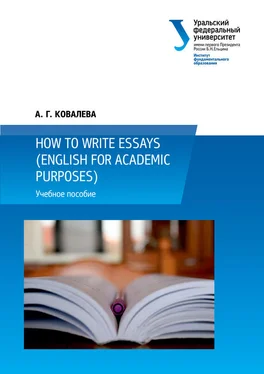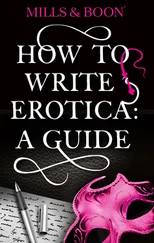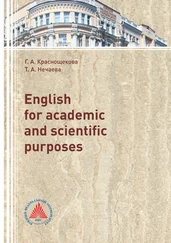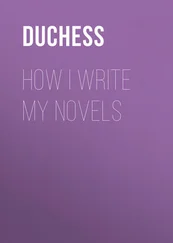Александра Ковалева
How to write essays (English for Academic Purposes)
Стандарты последнего поколения для высшего образования имеют новый взгляд на основные требования к результатам образования в высшей школе. Эти требования продиктованы современным состоянием общества.
Современные выпускники вузов должны обладать определенными общекультурными и профессиональными компетенциями.
Исследовательская деятельность помогает студентам и магистрам приобрести профессиональные компетенции, а иностранный язык расширяет круг профессионального общения.
Данное учебное пособие разработано для студентов и магистров всех направлений подготовки Института радиоэлектроники и информационных технологий – РтФ, имеющих в учебных планах дисциплину «Иностранный язык для научных целей».
Учебное пособие содержит практические советы по выбору темы научного исследования, методы исследования и общие правила оформления отчетной документации. Задания к каждому разделу дают студентам и магистрам практические навыки исследовательской деятельности с использованием аутентичных источников. Глоссарий дает возможность разобраться в терминологии пособия.
Пособие составлено на основе публикаций британских и американских изданий последних лет.
Пособие состоит из 17 глав. Каждый раздел посвящен определенному этапу исследовательской деятельности: выбор темы, поиск и отбор материала, формирование структуры исследовательской работы, написание основных глав, редактирование, оформление.
В целом, пособие охватывает широкий спектр различных видов деятельности студентов: различные виды чтения, реферирование, письмо.
MAIN STEPS OF THE WRITING PROCESS
For any essay to achieve high marks it’s essential to go through five distinct stages:
1. Interpretation of the question
2. Research
3. Planning
4. Writing
5. Revision
If you omit any of these or just rush them, certain familiar problems will emerge in your writing: irrelevance, weak structure, insufficient evidence and examples to support your arguments, lack of fluency between paragraphs, inconsistent arguments, and many others.
It’s also as important to separate each stage, so that you leave, say, at least a day between each of them. Of course, it may not always be possible for you to do this. You may have a number of competing obligations that leave you only a few days to complete the essay. On these occasions the skills you’ll learn in this book to manage your time will help you cope more effectively. They will also help you organise your time so that with most pieces of work you can in fact find sufficient time between each stage. Not only does this allow you to return to your ideas fresh, so that you’re able to see which of them needs to be edited out, but you will also find that your ideas and arguments have developed in the meantime.
Ideas are organic. Hardly ever are they the complete and finished article the moment you grasp them, like products on a supermarket shelf. They grow and develop over time. So, for example, returning to your plan after a day or two, you will almost inevitably discover new ideas, new evidence and new ways of developing your arguments. You’re also likely to see a more sensible and logical way of ordering your ideas.
And the same goes for all the other stages. Each time you return to your work after leaving it to lie unattended for a while, you will find your subconscious has worked on the ideas, restructuring them, answering questions that you weren’t sure of, and critically evaluating the arguments you’ve read in your texts.
But, be reassured, this is not an endless, confusing process, in which your ideas are thrown up in the air each time you return to your work. Within a short time, after revising your plan a couple of times, you will realise that it’s ready and you can begin writing. The same is true of your interpretation of the question, your research and the revision of your work. You will know when enough is enough. It may take three or four essays before you feel confident about your judgement, and during these you will have to rely on your tutor’s judgement, but it will come.
1 . These words are important for understanding the writing process. Match each word with the correct definition.
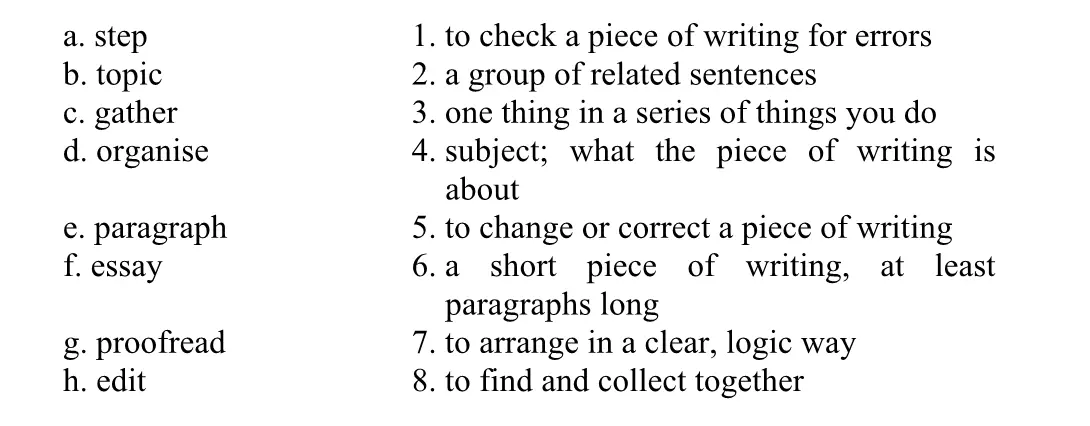
Pre-Writing: Choosing and Narrowing a Topic, Analising Concepts
Before you begin writing, you decide what you are going to write about. Then you plan what you are going to write. The process is called pre-writing.
Selecting a topic is possibly the most difficult part of doing research. Is it too big? Is it too narrow? Will I be able to find enough on it? Start by choosing a topic that you like or are curious about. You're going to be working on it for quite a while, so try and find one that's interesting and that you can reasonably cover in the time and space available.
The Reference shelves behind our Reference Desks are filled with books that can help you focus your topic. These books are good places to start your research when you know little about a topic, when you need an overview of a subject, or when you want a quick summary of basic ideas. They are also useful for discovering the names of important people, and can familiarize you with the vocabulary of the field. Encyclopedia articles are often followed by carefully selected bibliographies or lists of references to other works, useful items to have as you begin looking for additional information.
Though you should work on something you are interested in, you need to keep it in mind who your readers are and what their interests might be. The topic should be interesting, significant, important and comprehensive to the readers. You need to consider what your readers already know about your topic, their academic levels, what their beliefs are, etc.
Your research paper needs to be competing and answer all the questions you started with. You need to understand what other questions your readers may have, whether you have discussed all questions or hypotheses you have raised at the beginning of the paper.
There are many research papers that are very ambitious. They try to explain a big topic and since there are limitations on the length of the paper, they cover a broad topic only superficially. That is, the paper does not thoroughly answer questions it raised, and the readers may be left unsatisfied.
Читать дальше
